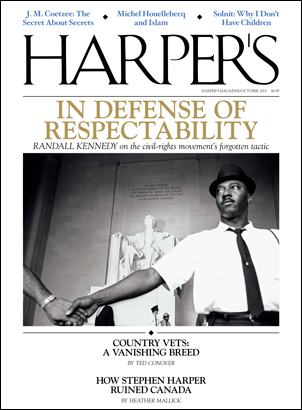Introducing the October Issue
Randall Kennedy defends respectability politics, Heather Mallick examines the career of Stephen Harper, Marco Roth reviews Houellebecq’s new novel, and more
 Since Michael Brown, eighteen years old and unarmed, was shot and killed by officer Darren Wilson in Ferguson, Missouri, just over a year ago, national attention—and outrage—has focused on the epidemic of young, African-American men being killed by police officers at disproportionate and alarming rates. Conversations about how to address this obvious injustice have tended to discount one of the Civil Rights Movement’s most effective tactics: the “appeal to respectability.” In his cover essay, “Lifting as We Climb,” Randall Kennedy, a professor at Harvard Law School, makes the progressive case for respectability politics, an approach whose pragmatism does not, as critics might claim, seek to elide the horror of racism. Growing up, Kennedy and his siblings were taught by their parents to think of themselves as “ambassadors of blackness,” he writes. “The fulfillment of our racial obligations required that we speak well, dress suitably, and mind our manners.” Kennedy’s parents acknowledged that their children were at a disadvantage—and if they objected to this cruel truth, they also believed that “one had to face reality with clear eyes in order to fashion responses with any hope of success.” Kennedy’s provocative essay asks whether it’s wrong for parents today to give their children the sort of talks that his parents gave him—and whether it’s right to condemn the kinds of manipulations of respectability that have proven, over the decades, to be such exceptionally good politics.
Since Michael Brown, eighteen years old and unarmed, was shot and killed by officer Darren Wilson in Ferguson, Missouri, just over a year ago, national attention—and outrage—has focused on the epidemic of young, African-American men being killed by police officers at disproportionate and alarming rates. Conversations about how to address this obvious injustice have tended to discount one of the Civil Rights Movement’s most effective tactics: the “appeal to respectability.” In his cover essay, “Lifting as We Climb,” Randall Kennedy, a professor at Harvard Law School, makes the progressive case for respectability politics, an approach whose pragmatism does not, as critics might claim, seek to elide the horror of racism. Growing up, Kennedy and his siblings were taught by their parents to think of themselves as “ambassadors of blackness,” he writes. “The fulfillment of our racial obligations required that we speak well, dress suitably, and mind our manners.” Kennedy’s parents acknowledged that their children were at a disadvantage—and if they objected to this cruel truth, they also believed that “one had to face reality with clear eyes in order to fashion responses with any hope of success.” Kennedy’s provocative essay asks whether it’s wrong for parents today to give their children the sort of talks that his parents gave him—and whether it’s right to condemn the kinds of manipulations of respectability that have proven, over the decades, to be such exceptionally good politics.
Ted Conover’s Folio—which tracks several months in the life of a rural large-animal veterinarian—treats the serious challenges that country vets, whose numbers are shrinking, face: injuries, clients who can’t pay, middle-of-the-night phone calls. But he also delights in the experience of following veterinarian Zach Vosburg on his rounds. He bears witness to the birth of a calf, watches farm dogs devour snipped-off bull testicles, and stands behind Vosburg as he does a “preg check”—feeling for a calf’s head through the wall of the bovine uterus with a gloved hand. It’s a portrait, at once tender and matter-of-fact, of a way of life known to few, perhaps, soon, to none.
“A decade ago,” Rebecca Solnit recalls in this month’s Easy Chair, “during a conversation that was supposed to be about a book I had written on politics, the British man interviewing me . . . hounded me about why I didn’t have children.” The comment outrages Solnit. But, over the course of her essay, her indignation becomes meditative—an examination of the “one-size-fits-all” formula for happiness that has led interviewers, time and again, to ask not about “the products of [her] mind . . . but about the fruit of [her] loins, or lack thereof.” “Society’s recipes for fulfillment,” she reminds us, “cause a great deal of unhappiness.”
Heather Mallick’s dispatch from Canada examines the career of Stephen Harper, the country’s prime minister and, it has been suggested, “a replicant of the Blade Runner variety.” The evidence is certainly convincing: “he speaks in a monotone, he’s impossibly rigid, and he seems unable to understand the emotions of others.” Since he took office in 2006, Mallick writes, Harper has imported some of the worst American policy ideas—slashing the federal budget, introducing mandatory prison sentences, attacking climate scientists, expanding the war on drugs—in an attempt to turn Canada into “a nastier version of Texas.” If he wins reelection on October 19, Mallick concludes, “Americans might want to consider a wall.”
Also in the October issue: a new short story by Steven Millhauser, about a man who refuses to be stood up by his dinner date; Hamilton Morris on amfonelic acid, a superstimulant with antibiotic properties; Marco Roth on Michel Houellebecq’s controversial new novel, Submission; and Jonathan Dee on Joy Williams, a writer whose wild and wildly inventive short fiction “reach[es], and inhabit[s], the moment in which the walls of a situation dissolve and the perceptual horizon . . . is widened, for better or worse.”


